- Home
- Eoin Colfer
The Fowl Twins Deny All Charges Page 9
The Fowl Twins Deny All Charges Read online
Page 9
The dwarves advanced, twirling their crystal swords in complicated patterns, forming almost hypnotic light fans in the late-afternoon sun.
“Ooh,” said Beckett. “Look.”
Look? thought Lazuli. They want you to look, that’s the whole point.
And she saved Beckett’s life the only way she could, by booting him in the backside, knocking the boy off the ledge just in time to avoid a sudden scything slash from a dwarf blade that seemed more deadly than pretty now.
Beckett was surprised for a nanosecond but then rolled easily onto the pebbled beach. When he stood, Lazuli saw that the boy’s entire demeanor had changed. He was battle ready now.
It’s about time, thought Lazuli, then she stopped thinking and started reacting as the dwarf switched targets and she was forced to retreat at speed. She used the unpredictable mixed bag of movements she’d learned from training in the martial art of Cos Tapa, which translates roughly from the Gnommish as quick-footed or of blurred feet. It is an aggressive combat style developed by the diminutive pixie race from a study of animals such as hyenas, cats, and small breeds of dogs, which are often forced to take on larger foes. The martial art was so effective that it had migrated to the human arsenal and was adapted by the legendary Madam Ko for use by the prospective bodyguards in her academy. Cos Tapa’s mantra was to always be on the attack, even in retreat.
Lazuli’s sensei in the Academy, a gnome who liked to speak in infuriating riddles, had once told her that The squinting mole sees only its own dreams.
Which Lazuli had considered for long enough to suspect it was useless in combat situations. However, the same gnome had once lost patience with her during a simulation and yelled, For Danu’s sake, Heitz! Even going backward, you can set up your opponent!
Which was a lot more to the point than that nonsense about moles.
Lazuli used this strategy now, and even with a dwarf blade whirling dangerously close to her unarmored stomach region, she kept an eye on her attacker’s stance to see if she could lure him off-balance.
Keep coming, she broadcast at the dwarf. Keep coming.
The Horteknut Reclaimer obliged with some enthu-siasm.
The second dwarf targeted Beckett on the beach. The blond twin was very impressed with the fancy footwork the chap used to approach. Initially facing away from Beckett, the Horteknut dwarf trotted up a dune and back-flipped off the top, landing in the surf behind the boy.
“Bravo,” said Beckett. “Very good.”
The dwarf too spoke, his voice garbled by mesh that covered his face. Beckett had never heard this tongue before. It was an aggressive-sounding language made even more so by the guess that the sentiment was in fact most likely aggressive.
By the end of the second sentence, Beckett felt he had enough grasp on the meaning to attempt conversation, though, as it would turn out, he was mostly wrong in this assumption.
“Wait, friend,” Beckett said, surprising the Reclaimer, who had never heard a human attempt any of the dwarf dialects. “There is no need for us to enrage the cattle.”
Beckett had misspoken, but this was not entirely his fault, as the Horteknut dialect was quite limited in the actual sounds contained therein. Linguists estimate that this particular vernacular, which is one of over a hundred dwarf variations, contains no more than twenty sounds in total, including clicks, strident vowels, and gagging noises. With so few available noises it is inevitable that certain words and even complete phrases sound almost exactly alike.
So, when Beckett said with some urgency that there was no need for them to enrage the cattle, what he actually meant to say was There is no need for us to engage in battle.
The actual phrase is altered somewhat here to make the point in English.
Surprisingly, this mangled attempt at Horteknut-speak stopped the Reclaimer in his tracks, and ironically, it had the desired effect of the intended phrase. It was the word cattle that did it, as this particular dwarf was terrified of cows (he had lost a good friend to a stampede in Brazil). So the dwarf spared a fraction of a second to spin around, spasmodically checking for cows, reasoning that in his long and bloody combat experience no human would be able to accomplish much in the way of attack in a mere fraction of a second. Which just goes to show how wrong a person can be.
For this fraction of a second gave Beckett Fowl ample time to land his favorite blow: the cluster punch.
To recap: The cluster punch is a nonlethal blow aimed at the junction of the body’s principal meridian lines just above the right kneecap. If an attacker could strike that cluster at precisely the right angle, with exactly the correct amount of pressure per square inch, the victim’s entire system would spasm and they would be left paralyzed for a brief period.
Unfortunately for Beckett, dwarf physiology is completely different from that of humans, even though dwarves are, roughly speaking, humanoid. It just so happens that dwarf meridian lines intersect above the left kneecap, something Beckett might have instinctively figured out had the Reclaimer not been swaddled in a suit of vines that concealed the tug of his tendons and the bloat of his gas pockets.
However, Beckett’s strike did have an unexpected side effect, which might lead one to believe that the gods of fortune favored the blond twin. The side effect was as follows: Male tunneling dwarves can store up to a thousand pints of compressed gas in their gastrointestinal systems. Technically, at this pressure the gas has mostly been converted to a supercritical fluid, and the dwarf supplementary intestine is lined with powerful constricting muscles that can contain even a packed-to-bursting intestine for short periods. The intestine is stoppered by an internal ring of muscle fed by a major artery that continues down through the right knee and around to the heart in a very delicate circuit. And, as you may have guessed, Beckett’s strike effectively closed off that artery, causing the muscle to fail.
For a moment, the dwarf felt nothing other than mild surprise that a human had managed to land a blow on a fearsome Reclaimer. Then his internal ring relaxed and a cyclone of air, liquid, and semisolids exploded through his bum flap, not exactly at the speed of sound, but certainly with quite a measure of speed and sound. The effect was spectacular: A thundering jet funneled through vents in the dwarf’s combat pantsuit and he corkscrewed into the air like a punctured balloon.
Beckett’s jaw dropped with surprise, even though his day had been fairly fart-centric already. This was surely the Mount Everest of flatulence. The Reclaimer was propelled along the beach and landed on the island’s northwesterly tip, where he disappeared into a hole that Beckett could not remember being there yesterday.
I can worry about that later, he thought. Laz is still fighting.
And fighting she was.
But not in a traditional sense, i.e., on the offensive, as Lazuli was seemingly in full retreat, drawing her bigger, more powerful, and more experienced opponent toward her. The dwarf’s shimmering sword cut light patterns in the air as it slashed toward Lazuli’s organs, but so far, the pixel was untouched…though the first cut did seem inevitable, as with each scythe the blade whistled closer to its target.
Then Lazuli stumbled backward, and Beckett’s heart dropped into his shoes.
No, Laz! he thought, and the sword flashed downward, surely to cleave his friend to the bone.
But somehow, Lazuli suddenly was not falling. She had jammed her rear foot into the earth and pistoned herself back the way she had come. This move seemed like it should have cracked her shin bone like a dry branch, unless of course the pixel had planned the whole thing.
Which of course she had.
I have one shot, she thought. A single punch to put this dwarf assassin down.
Yet Lazuli knew in her heart that one punch would not be enough, no matter where she hit him. She was vaguely aware that Beckett had pulled off something very Beckettian, but she could not spare so much as a flicker of her gaze toward the twin; all her attention was needed for the dwarf.
The dwarf grunted as he realized w
hat was going on. It was a grunt of grudging admiration for the pixel’s fighting spirit, but there was no anxiety in the noise. Yes, she would land a blow, but that would be the end of any attack. Yes, the dwarf might stumble a few steps backward, but by now his brother Reclaimer would have killed the human and could assist him with this hybrid. No doubt the ruckus behind him was as a result of the boy being slaughtered.
So the dwarf took a shot to the jaw, which sent him stumbling backward as foreseen, but he never could have foreseen what happened next.
Which was this:
The masked dwarf, realizing that his stumble would send him over a ledge and onto the beach some three feet below, decided to offset this tactical disadvantage by performing a trademark Horteknut backflip so that at least he might land on his own terms. And so, instead of making a futile attempt to halt his backward motion, he accelerated and threw himself over the edge. He sensed, in the way of virtuoso athletes, that the flip was good and he would stick a solid landing, and he also became aware that the human boy was directly below him. What he did not know was that this human boy had a trick up his sleeve—that being his arm, which was connected to his fist.
Beckett anticipated the dwarf’s flip and mapped out the trajectory before the Horteknut Reclaimer even took off. When the dwarf sailed overhead, Beckett nailed him with a cluster punch, which collapsed the dwarf’s muscle ring, releasing the jet of compressed air, supercritical fluid, and the semi-digested beef jerky that this Horteknut was never without, slamming the poor fellow into the ledge headfirst and knocking him out cold.
Lazuli clambered over the brink.
“Are…you…okay…Beck?” she asked between gasps for breath.
“I did a new thing,” said Beckett, gazing in awe at his own fist. “I broke two dwarves.”
Lazuli scanned the shoreline. “Where’s the second one?”
“Over there,” said Beckett, jerking a thumb. “He went down a hole that I don’t remember being there.”
“Tunnel,” pronounced Lazuli. “These two were the rear guard, and the rest went subterranean.”
Beckett tried to pick up a signal from his twin on his scar. “I can’t feel Myles,” he said. “He’s gone.”
Beckett’s posture was slumped, and Lazuli felt an ache of sympathy for him.
What we should do now is try to contact Commodore Short, she realized. She will summon the cavalry, and the navy, and possibly the air force.
But Lazuli knew that dwarf tunnels, especially Horteknut ones, were built to collapse shortly after use, and if they didn’t follow their quarry right now, not even an LEP scout with ground-penetrating radar would have a prayer of picking up the trail.
Lazuli flipped the unconscious dwarf onto his back and pulled off his suit with a half dozen explosive yanks, leaving the dwarf clad in a skintight onesie that had not seen the inside of a washing machine in some time. The outer suit was a no-tech affair that seemed to be woven from tree roots that may or may not have been still alive. It was pungent and too wide to fit well, but from a distance she might pass for a dwarf for maybe ten seconds.
Maybe ten seconds will be enough, she thought, trying not to imagine what an entire band of Horteknuts would do to an imposter when she was found out.
While Lazuli wriggled into the suit and helmet, Beckett, for perhaps the first time in his life, assumed the role of responsible partner. “Maybe you should wait here, Laz,” he said, the cautionary words not sounding right coming out of his face. “I thought maybe Myles was taken by people we could run rings around, but these fellows are dangerous. Even Oswald didn’t like them. They’re spooky, and they have swords.”
Lazuli appropriated the dwarf’s weapon and gave it a few practice swings. “I have a sword too now,” she said.
“Still,” said Beckett, “maybe I should go alone. Myles is my brother.”
“That’s right,” said Lazuli, sliding the blade into its sheath on her hip. “And he’s my friend. In fact, I might be his only friend.”
Beckett nodded and then, without another word, ran toward the tunnel mouth.
In Captivity
While Beckett was displaying an uncharacteristic level of caution, Myles had seemingly also strayed from his usual behavior patterns and was displaying all the signs of someone having a meltdown. Anyone who was familiar with the boy or had even absently perused his file would be most skeptical of this behavior. But there was no one in the room to call him out for his tantrum. No one immediately visible, at any rate.
The emotional display came from nowhere. One second Myles was reclining in funereal contemplation, arms crossed in vampire fashion, and the next he was sobbing into his hands.
“Oh dear,” said the boy loudly and with much wringing of fingers, which was a well-documented physical manifestation of distress. “Woe is me, and boo-hoo.”
Myles actually said boo-hoo, which is akin to reading stage directions aloud.
“This is terrible,” said the Fowl twin, rising from his bed of spit. “Awful, in fact. And the most logical thing for me to do, as a typical twelve-year-old, would be to blurt out all my secrets and hope no one overhears. Or perhaps I should talk into my sleeve very loudly, as if there is a communicator stitched in there.” Myles then proceeded to talk into his sleeve. “They have caught me, Your Majesty. My call sign is one-zero-zero-one-zero-zero-one. Drain my accounts. Burn my fake mustache and vintage troll dolls. Remember: Tell no one about the guided missile in my shoe, or the laser in my wristwatch.”
In the name of transparency, it should be pointed out that Myles had neither a missile nor a laser secreted anywhere about his person, for, as you have no doubt guessed, this little freak-out act was precisely that: an act. And not one intended to fool anyone with so much as half a brain.
And just as quickly as it began, the frantic monologue was over. Myles coughed gently into his fist, straightened his golden tie, and perched on the corner of the wobbly mattress.
“Is that sufficient?” he asked the empty room. “Or should I invent more nuggets of false information?”
The empty room did not respond, as mud walls are not given to conversation, but Myles’s ruse did have an effect, as a particularly deep shadow detached itself from a larger glob behind a tower of cardboard boxes and stepped into the spittle glow.
“Aha!” exclaimed Myles. “I suspected as much. It’s an old interrogation technique. Throw a scare into the subject and see what tumbles out of his gibbering mouth.”
The shadow tugged off its hood to reveal a dwarf beneath. Another female. This one with skin almost as dark as her shadow suit and deep blue runes tattooed on both cheeks.
“It is a technique that often bears fruit,” she said. Her accent was not as pronounced as Gveld’s, but she attacked the consonants with some gusto all the same. “I think this is not your first time in the question box, Mud Boy.”
Myles confirmed this with a nod. “I have been in many a question box, for I know the answers to many questions. All a person has to do is ask.”
The dwarf huffed a chuckle. “We ask and, just like that, you will answer?”
Myles considered this. “That depends on the question.”
The lady rolled up her hood, stuffing it into a pocket. “One-zero-zero-one-zero-zero-one,” she said. “That is a human security agency call sign, if I am not mistaken.”
Myles nodded, then wagged his finger at her shadowy torso. “And your suit—ultra-black, I presume?”
The disembodied head nodded back. “It absorbs all light, which can be useful in certain dark situations.”
Myles was impressed. “I have never seen it manufactured on such a scale. Impressive to be sure, mademoiselle.”
The dwarf sneered. “Mademoiselle? I am no French woman, Mud Boy. I am Gundred Horteknut. Second soldier of the Horteknut Seven.”
Myles filed away this information, which he counted easily won. He was dealing with soldiers, there were seven of them, and this Gundred person was second-in-command. N
ot that Myles’s answer box was exactly empty when it came to Horteknut factoids. Artemis’s LEP files had yielded quite a treasure trove on the militant wing of the Horteknut family. Even so, it was very considerate of successive members of the band to present their credentials with barely any provocation.
“Second soldier,” he said. “Most impressive.”
Gundred twisted her features into a magnificent scowl. “Spare me the empty compliments, Mud Boy. Your smugness is unearned. I was merely hoping to save you a great deal of pain. Gveld granted me these few moments to trick some information out of you, but even now she readies her torture chest, so we will get our information one way or another.”
Myles felt that perhaps his smugness was indeed misplaced, and he silently chided himself for revealing his nature.
I have shown my hand with my playacting routine. And by hand, I mean brain, and consequently the dwarves will never underestimate me again.
In this Myles was correct. He had well and truly broken the first rule of Fowl negotiations, which was, as Artemis had once put it, to be just smart enough to meet your opponent’s expectations but never smart enough to meet your own.
Gundred Horteknut walked to the door and pounded on the wood with the flat of her palm. “Your family are charged with many crimes against the dwarf nation,” she said over her shoulder. “And the reckoning comes today.”
“I deny all charges,” said Myles automatically, but it occurred to the Fowl twin that this was not even the first time today that he had denied charges, and his denial probably rang as hollow this time as it had the last.
The door was opened from without and Gundred’s disembodied head slipped through the gap, presumably taking her camouflaged body with it.
Unless the dwarves have yet another marvelous talent to add to their quite extraordinary list.
And the list was indeed extraordinary, made more so by the fact that it was incomplete. Even the fairies’ own files on the dwarf nations were woefully inadequate, and it seemed as though every time a dwarf popped up, they displayed some skill or other that had never been photographed or documented in any way. And as for human files, they were hilariously light on detail.

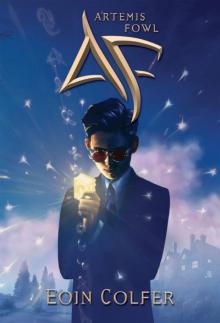 Artemis Fowl
Artemis Fowl Plugged
Plugged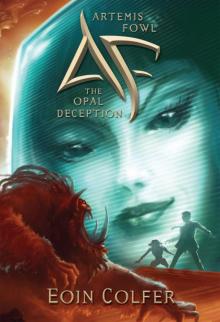 The Opal Deception
The Opal Deception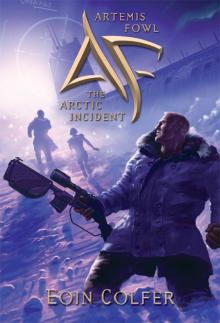 The Arctic Incident
The Arctic Incident The Wish List
The Wish List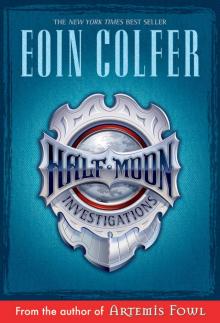 Novel - Half Moon Investigations
Novel - Half Moon Investigations The Supernaturalist
The Supernaturalist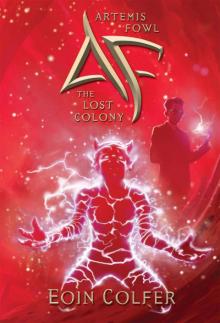 The Lost Colony
The Lost Colony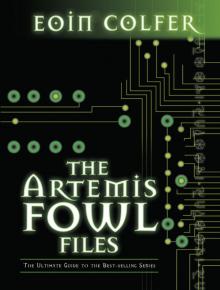 The Artemis Fowl Files
The Artemis Fowl Files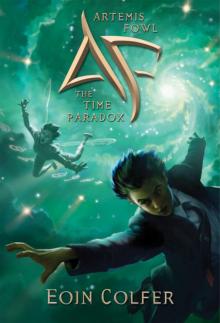 The Time Paradox
The Time Paradox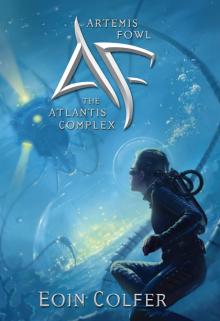 The Atlantis Complex
The Atlantis Complex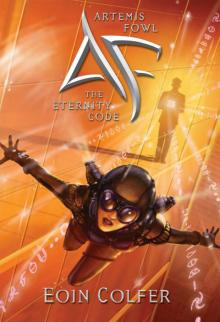 The Eternity Code
The Eternity Code The Time Paradox (Disney)
The Time Paradox (Disney)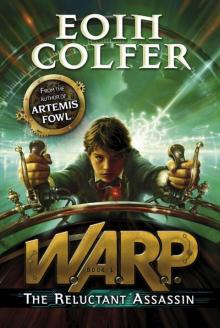 The Reluctant Assassin
The Reluctant Assassin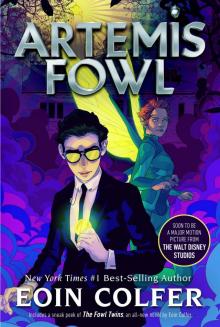 Artemis Fowl (Disney)
Artemis Fowl (Disney) Highfire
Highfire The Last Guardian
The Last Guardian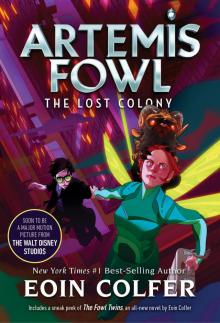 The Lost Colony (Disney)
The Lost Colony (Disney) Screwed: A Novel
Screwed: A Novel Novel - Airman
Novel - Airman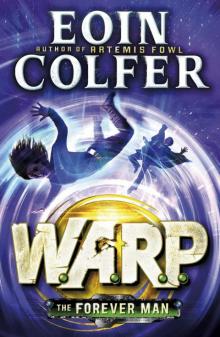 The Forever Man
The Forever Man And Another Thing...
And Another Thing...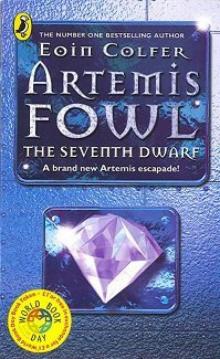 The Seventh Dwarf
The Seventh Dwarf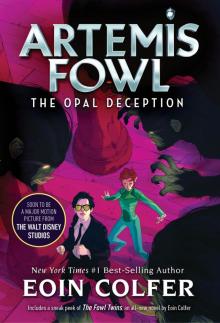 The Opal Deception (Disney)
The Opal Deception (Disney)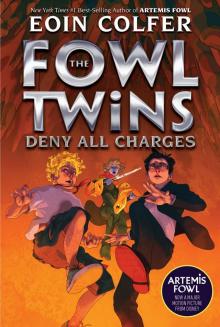 The Fowl Twins Deny All Charges
The Fowl Twins Deny All Charges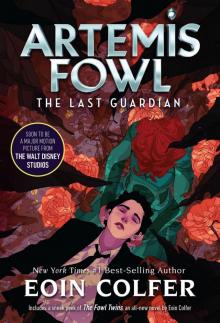 The Last Guardian (Disney)
The Last Guardian (Disney) The Hangman's Revolution
The Hangman's Revolution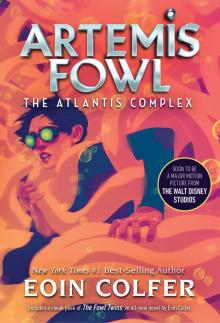 The Atlantis Complex (Disney)
The Atlantis Complex (Disney) The Eternity Code (Disney)
The Eternity Code (Disney)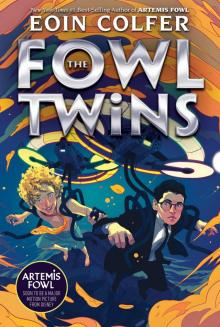 The Fowl Twins
The Fowl Twins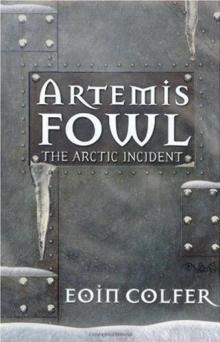 Artemis Fowl. The Arctic Incident af-2
Artemis Fowl. The Arctic Incident af-2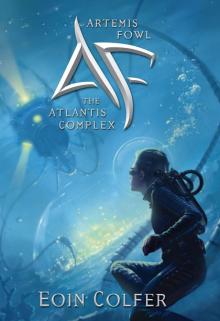 Artemis Fowl and the Atlantis Complex af-7
Artemis Fowl and the Atlantis Complex af-7 Artemis Fowl. The Opal Deception af-4
Artemis Fowl. The Opal Deception af-4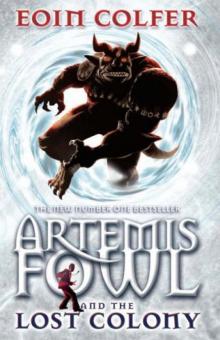 Artemis Fowl. The Lost Colony af-5
Artemis Fowl. The Lost Colony af-5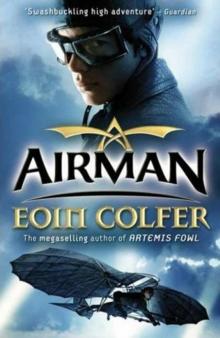 Airman
Airman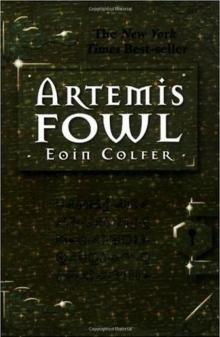 Artemis Fowl af-1
Artemis Fowl af-1 Artemis Fowl: The Eternity Code af-3
Artemis Fowl: The Eternity Code af-3 Screwed dm-2
Screwed dm-2